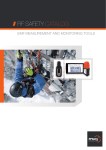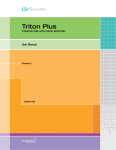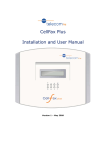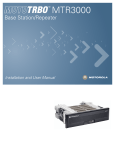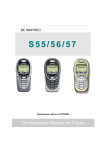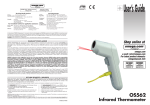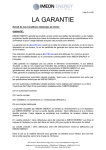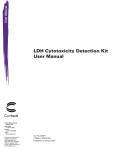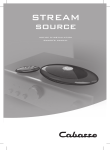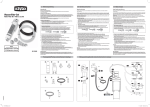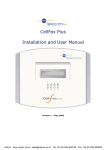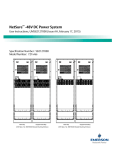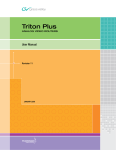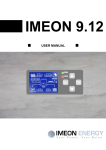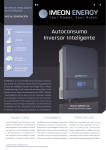Download MW GROUP_SAR_FINAL_0
Transcript
RF Safety SAR & HAC test benches © SATIMO 2008 > A few basics on SAR & HAC measurements The proliferation of consumer mobile telecommunication equipment (MTE) has raised concerns about potential adverse health effects due to electromagnetic field exposure. For radio frequency safety purposes, international regulatory bodies and committees have elaborated standards to which MTE should comply. SATIMO offers a range of Specific Absorption Rate (SAR) and Hearing Aid Compatibility (HAC) measurement systems for the test and certification of MTE. Why do we measure SAR values? The radio frequency (RF) energy radiated by MTE is absorbed in the body and produces heat, which is carried away by the body’s thermoregulatory processes. The rate at which RF electromagnetic energy is imparted to an element or mass of a biological body is called Specific Absorption Rate (SAR). The SAR value is expressed as energy flow (power) per unit of mass in units of W/kg. What are the main SAR standards? In 1998, the International Commission on Non-Ionizing Radiation Protection (ICNIRP) elaborated guidelines to limit exposure to electric, magnetic and electromagnetic fields. Based on these guidelines, in 2001, the European Community published documents to define basic SAR restrictions and measurement protocols between 300 MHz and 3 GHz for handheld devices (EN 50360 and EN 50361). In addition to the EN standard, it exists today two other major standards: the IEEE 1528 and the IEC 62209. In 2008, the IEC 62209-2 is expanding the scope of the standard IEC 62209-1 to the frequency range of 30 MHz to 6 GHz. It will also address a broader category of devices, such as laptops or PDAs. For base station testing, the European EN 50383 standard concerns the calculation and measurement of electromagnetic field strength and SAR related to human exposure from radio base stations and fixed terminal stations for wireless communication (110 MHz to 40 GHz). Most countries (such as the USA, European Members, Australia, Japan or Canada) have adopted regulations that require MTE to be tested in order to ensure their compliancy to basic SAR restrictions. All these regulations are consistent with each other in the sense that they all follow almost the same methodology although the values themselves can differ. 1 How do we measure SAR values? What are HAC measurements? The SAR values are complex to measure as the penetration of energy within human tissues depends on many factors, such as the type of the phone, the shape of the user’s head or the frequency. For this reason, SAR measurements are performed in laboratory using specific instrumentation defined in the standards: head phantom, liquid, E-field probe… The use of mobile phones together with hearing aid devices can cause interferences. For this reason, the Federal Communications Commission (FCC) has required that mobile phone compatibility with hearing aid devices be measured. This compatibility must be measured in the two modes commonly used by the hearing aid: microphone mode and telecoil mode. The FCC has set ratings in order to calculate the risks of interference: • M Ratings concern the microphone mode. • T Ratings concern the telecoil mode. The American National Standards Institute adopted the ANSI C63.19 standard in 2001. According to the FCC, a large percentage of mobile phones marketed by each manufacturer should be HAC compatible (M3-4 and T3-4 rating). The measurement process consists in using a scanning system to measure the internal E-field distribution in a phantom model filled with liquid. The shape of the head and the liquids simulate the human head and tissue. The device under test emits at maximum power and is positioned according to the procedure of the standards. The E-field value is measured with a miniature E-field probe. Indeed, E-field probes are the most appropriate sensor to measure the SAR, due to their sensitivity and fast time response. The E-field is calculated using the following formula: SAR (W/Kg) = E (V/m)2/ Sigma () being conductivity of the liquid and rho () the density of the liquid. Finally, from the measured E-field values, the SAR distribution, the 1g and 10g mass averaged SAR values are calculated. A 6-axis robot is necessary to reach the measurement uncertainty limit stipulated in the standards. 2 How do we define HAC rating? The HAC rating is measured in two steps: • RF test (HA microphone mode): measure the near-field electric and magnetic fields emitted by the phone using an E-field and H-field miniature probe. • Audio test (HA telecoil mode): measure the magnetic fields emitted by the phone using a T-coil probe. > COMOSAR bench SATIMO provides a complete line of SAR products which ensures compliance to certification standards as well as flexibility in terms of set up and use. From our own measurement activity and the information gathered from customers’ experience, we continuously optimize our system. The COMOSAR standard bench includes a set of additional accessories and equipment to cover all customer needs and offers full turn-key systems. COMOSAR TWIN configuration > Product category: > Included equipment: • SAR measurement bench • KUKA KR5 6 axis robot, GPIB card; 1 E field probe (with liquids and dipoles), tables, Video Positioning System (VPS), SAM phantom, handset positioning system, 2 X 25 L containers of liquids; validation dipoles and multimeter (Keithley) > Function: • Measures SAR values for the development, testing and certification of mobile telecommunication equipment (mobile phone, pager, walkie talkie, personal digital agenda, and computers) > User profile: • Certification bodies, regulatory bodies, R&D and test laboratories, terminal manufacturers, antenna manufacturers > Frequency bands: > Available additional bench/kit: • HAC bench, probe calibration bench (CALISAR) and liquid measurement kit > Optional additional equipment: • Extra table/phantoms and positioning system for TWIN set up; probe, dipole and liquid for additional frequencies • 30 MHz to 6 GHz > Additional required equipment: > Related standard: • Network emulator (BS simulator), power meter, power amplifier and signal generator • IEEE 1528; FCC OET Bulletin 65 (Ed. 97-01) supplement C; IEC 62209-1/ IEC 62209-2; EN 50361:2001; EN 50383 > Related services: > Related software: • Probe calibration, installation and training, extended warranty, system customization upon request • OPENSAR 3 Ethernet Vector network analyser OPENSAR software Robot Signal generator GPIB, Ethernet, RS 232 Network emulator Voltmeter Compliant COMOSAR bench has been developed to perform SAR measurements for the certification of handsets in full compliance with the international standards in force. It is available with a range of additional equipment and accessories to cover all needs with regard to these standards. Flexible Set up COMOSAR can be delivered with one or two phantom tables. The tables can be used for most available SATIMO phantoms (SAM or Elliptic), as well as for HAC equipment. TWIN configuration is particularly useful to perform measurements on several frequencies without having to change the liquid. The already extensive list of instrumentation drivers developed in the OPENSAR software (including R&S, Anritsu, Agilent, Willtek, Wavetek… equipments) can include additional drivers upon request to integrate any available instrumentation on the market: signal generator, power meter, base station simulator or vector network analyser. Other specific software developments can also be made upon request. Reduce Measurement Time SATIMO has also implemented several SW features to enhance the measurement speed: • The control of the radio tester allows the measurement of the 3 channels simultaneously through inter-channel handover. • Adaptive path algorithm reduces the number of points measured during the area scan. 4 Power meter • 3D truncation algorithm quickens the zoom scan process. As a result, the combination of these algorithms brings measurement time for one channel down to 1 minute and for 3 channels down to 2 minutes for one handset in a given position. Reduce Measurement Uncertainties All components of the COMOSAR System have been designed to facilitate the exact positioning of the probes and the phantoms as well as the Devices Under Test (DUT): • A Video Positioning System (VPS) ensures the probes’ position at ± 0.1mm. The VPS is fixed on the table plate during the installation process. It allows measurement of the exact dimensions of the probe to make sure that it is perfectly positioned. • The handset positioning system includes two rails with a precision > 1°. • The switch from the tilt to the cheek position is possible in 1 move. • OPENSAR includes a module to measure the dielectric properties of the liquid. The module enables the liquid characteristics to be checked and potential deviation over time to be measured. • The probes are made of high permittivity material to minimize E-field disturbance. Hence, it is possible to perform measurements without any amplification. According to SAR measurement standards, the overall uncertainties of the system must be ≤ 30%. > OPENSAR SW OPENSAR software has been developed to perform SAR standard compliant measurements. It is part of SATIMO’s COMOSAR bench and controls all the instrumentation delivered with this bench. In addition, OPENSAR can easily integrate additional drivers upon customer request. OPENSAR software also uses optimized algorithms, particularly useful for the development phase of handset design. > Product category: > Related standard: • Software • IEEE 1528; FCC OET Bulletin 65 (Ed. 97-01) supplement C; IEC 62209-1/ IEC 62209-2; EN 50361:2001; EN 50383 > Function: • Controls COMOSAR test bench instrumentation for both certification and fast R&D measurements > Optional additional modules: • Liquid measurement > User profile: • SAR bench users 5 Main Functions OPENSAR is a user friendly interface to supervise the proper functioning of the system: • Configures measurement: once the measurement parameters have been defined, they will be loaded automatically. • Imports handset 3D files to be used by the interface (3DS, IGES, STEP……). • Defines easily the probe path and resolution in plane and volume mode. • Generates Word reports automatically and customizes the format of these reports. • Compares FDTD simulation (CST format) with measurement data in one interface. • Gives views of E field amplitude in 3 modes: - 3 D view of plane and volume measurements, - 2 D view for each sensor of the probe and cut plan of the points being currently measured during the volume scan measurement. Optimized algorithms to reduce measurement time Measurement time is a key factor in SAR calculation. OPENSAR uses optimized algorithms(1) to: • Reduce the 2D and 3D scanning time from about 15 minutes (one phone, one position, 1 channel) down to 1 minute through 2D quick peak detection and 3D cube truncation algorithms. • Halve the calculation time through handover between the low, middle and high channels within the same frequency. (1) “SAR Measurement time reducing via optimization algorithms and interpolation scheme”, Jérôme Luc, Romain Butet, Emmanuel Le Brusq, Yann Toutain, SATIMO, Plouzané, France. Presented at BEMS conference 2006, Cancun, Mexico. This paper is referenced in the IEC 62209-2 standard. Hardware requirements The measurement of liquid dielectric properties is a module that can be integrated in OPENSAR. This enables the liquid values to be automatically updated. 6 Advised 17’’ screen PC Pentium 2.4 GHz Cable link 1 LAN Ethernet Operating system Windows 98/2000/XP RAM 512 MB (1 GB recommended) Software MS Word/Excel Ports LAN + 2 slot PCI > COMOHAC bench & SW > Product category: > Related software: • HAC measurement bench • OPENHAC SW > Function: > Included equipment: • Measures the compatibility of hearing aid devices with handset • E and H field probes, T-coil probe, Data Acquisition Module, validation dipoles and positioning system > User profile: > Optional additional equipment: • Certification bodies, regulatory bodies, R&D and test laboratories, terminal manufacturers, antenna manufacturers • Helmholtz coil > Related standard: • Network emulator (BS simulator) with audio option, power meter, power amplifier, and signal generator > Additional required equipment: • ANSI C63-19 7 The COMOHAC bench allows measurements to be performed in compliance with the ANSI C63.19 standard. It can be used with the robot and device positioning system of the COMOSAR bench. The COMOHAC bench enables the M (RF test) and T (audio test) rating of the phone to be defined. RF measurement chain Ethernet OPENHAC Software GPIB GPIB Bus Robot Voltmeter E-Field probe Network emulator with audio option H-Field probe Audio measurement chain Ethernet OPENHAC Software PCI GPIB Bus Robot Audio daq Network emulator with audio option 8 T-Coil probe Compliant ➊ Technical characteristics of validation dipole RF Emissions (ANSI C63.19 clause 4) • RF electric field emissions. • RF magnetic field emissions. Please refer to dipole validation sheet on P22 T-coil Mode (ANSI C63.19 clause 6) • T-coil mode, magnetic signal strength in the audio band. • T-coil mode, magnetic signal frequency response through the audio band. • T-coil mode, magnetic signal and noise articulation index. HAC positioning system • Allows the correct positioning of the handset in relation to the tip of the probe. ➋ Technical characteristics of E-field and T-coil probes Please refer to probe sheet on P14 ➌ Technical characteristics of audio data acquisition Specification Resolution: 24-bit Dynamic range: 118 dB Sampling rate: 204.8 Ks/s Bandwidth 1/1 and 1/3 octave Weighting Linear and A-weighting Interface PCI card Fully Automated Software ➍ Hardware requirements • All the instrumentation and data acquisition is managed via Bus GPIB, Ethernet or RS 232 (…) from the system PC. • Configuration files (phantom, probe, measurement parameters….) are user-definable. • Easy to learn and user-friendly: user manual, 3D visualization. • Automatic report generation: - max. E & H valves (cells automatically excluded in accordance with C63.19). - magnetic field strength axial and radial calculation, signal quality calculation and frequency response curve data. • Possibility to add automatic custom report generation. Advised 17’’ screen PC Pentium 2.4 GHz Cable link 1 LAN Ethernet Operating system Windows 98/2000/XP RAM 512 MB (1 GB recommended) Software MS Word/Excel Ports LAN + 3 slot PCI 9 > CALISAR Bench The calibration process allows the assessment of the relation between the theoretical E-field and the effective voltage at the tip of the probe using a waveguide method. In a second step, the bench measures the isotropy (axial and hemispherical) and linearity values of the probe. CALISAR E-field probe calibration software allows the following equipment to be controlled: robot, voltmeter, synthesizer and power meter. > Product category: > Related software: • Probe calibration bench • CALISAR software > Function: > Included Equipment: • Calibrates E field probes used for SAR measurements • Mechanical assembly system, 2 waveguides > User profile: • Certification and regulatory bodies > Related standard: • IEEE 1528; FCC OET Bulletin 65 (Ed. 97-01) supplement C; IEC 62209-1; EN 50361:2001; EN 50383 10 > Additional required equipment: • Power meter, power amplifier, signal generator, directional coupler CALISAR software Ethernet Signal generator GPIB, Ethernet, RS 232 Voltmeter Power amplifier Robot Gel Power meter Coupler Waveguide Main Functions Hardware requirements • Defines measurement parameters: frequency, liquid properties, cable loss and waveguide S11. • Checks if all devices are correctly connected to the PC and configures GBIB address for each instrument. • Calculates isotropy (axial, hemispheric) and linearity values. • Creates a Word report. • Defines the robot reference point of the VAT and memorizes this reference. • Exports probe factor in OPENSAR format. • Use of the VPS for automatic reference. Advised 17’’ screen PC Pentium 2.4 GHz Cable link 1 LAN Ethernet Operating system Windows 98/2000/XP RAM 512 MB (1 GB recommended) Software MS Word/Excel Ports LAN + 2 slot PCI 11 > LIMESAR LIMESAR has been developed by SATIMO to measure liquid dielectric properties (complex permittivity and conductivity). The kit allows ensuring that properties of the liquid remain compliant over the time to the applicable standards. LIMESAR can be integrated to OPENSAR SW, which means that the last measured values can be automatically updated for further SAR measurements. > Product category: > Related software: • Liquid measurement kit • OPENSAR and CALISAR > Function: > Related equipment: • Assess the dielectric properties of SAR and CTIA liquids • SAR liquids, CTIA liquids > User profile: > Included equipment: • SAR bench users • Liquid measurement probe, RF cable, 3 bottles, 1 vice > Related standard: > Additional required equipment: • IEEE 1528; FCC OET Bulletin 65 (Ed. 97-01) supplement C; IEC 62209-1/ IEC 62209-2; EN 50361:2001; EN 50383 • Vector Network Analyzer, SMA female calibration kit • LIMESAR can be used with any Network Analyzer available on the market. • LIMESAR probe can measure the entire frequency band up to 6 GHz. 12 LIMESAR is compliant with the applicable standards ➊ The probe • The contact probe is open-ended coaxial transmission line sections. • It measures the reflection coefficient with respect to the open-circuit end, using a network analyzer. • It is wide band. ➋ The software PROBE CALIBRATION • Calibration of the VNA in Short-Open-Load (less sensitive to phase error during liquid measurements) • Calibration according to 2 standards: air and deionised water • No short circuit is used • It includes information on calibration and parameters of the VNA for the applicable frequency band • It determines the measurement value in function of the frequency • It updates automatically the values in the OPENSAR SW or exports the values in a text file • It gives directly the deviation from the target value in order to quickly verify that the liquid properties are within the acceptable range (IEC, IEEE, FCC……) 13 > Probes E-field probe SATIMO’s field detection probes are composed of three orthogonal dipoles or loops linked to special Schottky diodes with low detection thresholds. The probes allow the measurement of electric or magnetic fields in liquids or in the air, as defined in the standards. H-field probe T-coil probe > Product category: > Frequency bands: • Field probe • 30 MHz to 6 GHz > Function: > Related standard: • Measures field in SAR and HAC benches • IEEE 1528; FCC OET Bulletin 65 (Ed. 97-01) supplement C; IEC 62209-1/ IEC 62209-2; EN 50361:2001; EN 50383; ANSI 63.19 > User profile: • SAR and HAC bench users > Related services: • Calibration 14 A Set of High Performance Probes to Perform SAR and HAC Measurements A range of E and H field probes are available from 30 MHz to 6 GHz, depending on the applicable standards. The patented shape of each probe optimizes the functioning and isotropy of the probe over the entire frequency range. E-field probes MECHANICAL ELECTRICAL SAR Length HAC SAR 330 mm Dipole length High resistance line 3.3-4.5 mm Axial isotropy in human-equivalent liquids Maximum external diameter 8 mm Hemispherical Isotropy in human-equivalent liquids < 0.5 dB Probe tip external diameter 5 mm Linearity in human- equivalent liquid ± 0.25 dB Distance between diode and the probe tip < 2.7 mm Connectors < 2 mm 6 contact male plug (Hirose SR30) Dynamic in human- equivalent liquid Dynamic in the air HAC 1MΩ to 2MΩ < 0.25 dB 0.001-100 Watts/kg 2-500 V/m H-field probe MECHANICAL ELECTRICAL Length Linearity Loop length ± 0.2 dB 330 mm Maximum external diameter 8 mm Axial isotropy < ± 0.25 dB Probe tip external diameter 6 mm Dynamic range 0.01-2A/m Distance between diode and the probe tip 2 mm High resistance line 1MΩ to 2MΩ Connectors 6 contact male plug (Hirose SR30) Technical characteristics of T-coil probe Dimension 350 X 12 mm One coil 6,55 mm length X 2.29 mm diameter Frequency 0.1-20 KHz Sensitivity -60.5 dB (V/A/m) with ± 0.5 dB on the whole band Measurements Both axial and radial Connector 6 contact male plug (compatible with SAR support) and BNC 15 > SAM phantom The SAM phantom (Specific Anthropomorphic Mannequin) developed by SATIMO is produced in accordance with the 3D-CAD files as specified in the standards and is delivered with a compliance certificate. It has been designed to fit the COMOSAR phantom tables and is delivered with a plastic cover to prevent liquid evaporation. > Product category: > Related standard: • Phantom • IEEE 1528; FCC OET Bulletin 65 (Ed. 97-01) supplement C; IEC 62209-1/ IEC 62209-2; EN 50361:2001 > Function: • Contains liquids that simulate human tissues (head and body) for SAR measurements > Related equipment: • COMOSAR table, positioning system > User profile: • SAR bench users 16 Compliant As stipulated in the standards, the SAM phantom is made of low loss and low permittivity material. The material is resistant to Glycol and offers high rigidity (composite material based on fibreglass). The low loss ear spacer provides spacing of 6 mm from the tissue boundary at the Ear Reference Point (ERP) within a tolerance of less than ± 0.2 mm. Easy and Precise Positioning The SAM phantom has been designed so that positions can be easily reproduced. It includes reference points to position the DUT and probe. 4 reference points are available: • one on the top part of the phantom to position the tip of the probe correctly. • one in the centre of each of the phantom’s parts (right head, left head and flat part). In addition, the outside shell of the phantom includes a perpendicular cross-section (between the ear reference point and the mouth, as well as between the neck and the forehead). This cross-section is used as a reference to position the acoustic output of the device. TWIN SAM phantom MECHANICAL ELECTRICAL Overall thickness 2 ± 0.2 mm (except ear area) Relative permittivity 3.4 Dimensions 1000 mm (L) X 500 mm (W) X 200 mm (H) Loss tangent 0.02 Maximum volume 27 L Material Fiberglass based 17 > Flat phantoms SATIMO’s flat phantoms ensure compliance to standards (elliptic phantom for IEC and base station for EN related standards). They are made of material that fulfils the following requirements: • The dielectric properties are respected. It is a low loss material with a relative permittivity ≤5 and loss tangent ≤0.05. • It is resistant to head and body liquid component (glycol). • It is extremely strong (max. sagging < 1% of the maximum size of the DUT). All phantoms are delivered with a plastic cover to prevent liquid evaporation. Reference points on the phantom allow repeatable positioning of the DUT. > Product category: > Related standard: • Phantom • IEC 62209-2 (elliptic flat phantom); EN 50383 (rectangular flat phantom for base station measurements); IEEE 1528; IEC 62209-1; EN 50361:2001; FCC OET Bulletin 65 (Ed. 97-01) supplement C (custom flat phantoms) > Function: • Contains liquids for the simulation of human tissues for body, handset, larger devices and base station SAR measurements > User profile: • SAR bench users 18 > Related equipment: • COMOSAR table, positioning systems Elliptic Phantom for Body Measurement Technical & mechanical characteristics Shell thickness 2 mm ± 0.2 mm Filling volume 25 L Dimensions 600 mm X 400 mm X 200 mm Permittivity 4.4 Loss tangent 0.017 IEC 62 209-2 Elliptic Phantom Base Station Flat Phantom Technical & mechanical characteristics Shell thickness 6 mm ± 0.2 mm Filling volume 50 L Dimensions 800 mm X 500 mm X 200 mm Permittivity 4.4 Loss tangent 0.017 EN50383 Base station flat phantom Custom Flat Phantoms Example of a custom phantom made for a handset manufacturer: SATIMO develops custom flat phantoms for the special needs of its clients, such as the body flat phantom. The main advantage of using a perfectly fitted phantom is the lower amount of liquid needed. Indeed, whereas a bigger phantom can suit both base station and body measurement applications, the body flat phantom requires between 2 to 12 times less liquid, depending on the tested device. Technical & mechanical characteristics Shell thickness 2 mm ± 0.2 mm Filling volume 10 L Dimensions 340 mm X 240 mm X 200 mm Permittivity 3.3 Loss tangent 0.02 19 > Positioning systems The handset positioning system developed by SATIMO complies with the standards in force for SAR and HAC measurements. > Product category: > User profile: • Device positioning system for SAR and HAC measurements • SAR and HAC bench users > Function: • Positions handset, larger telecommunication terminals and BSA for SAR and HAC measurements 20 > Related standard: • IEEE 1528; FCC OET Bulletin 65 (Ed. 97-01) supplement C; IEC 62209-1/ IEC 62209-2; EN 50361:2001; EN 50383 Handset Positioning System (used with Comosar and HAC bench) Device Positioning System (used with Comosar bench) The positioning system is made of an extremely stable material, which ensures easy handling and reproducible positioning. It also allows correct positioning of the dipoles referenced by the IEEE, ANSI and IEC. Material properties: same as handset positioning system. Material properties: the positioning system is made of PETP. This material offers a low permittivity of 3.2 and low loss, with a loss tangent of 0.005 to minimize the influence of the DUT on measurement results. Mechanical properties: 2 rows of rail to cover easily the surface of the phantom. The fixing plate is perfectly adapted to larger devices, such as a PC which can be positioned in all configurations. Accuracy and precision: graduated scale available on each axis. The DUT is fixed with a specific adaptable grip. Mechanical properties: the positioning system developed by SATIMO allows a positioning resolution better than 1 mm. The system is fixed on a bottom rail “x axis” so that the positioning system can be quickly moved from the right to the left part of the phantom. In addition, it can be moved on a perpendicular “y axis” and the height can be adapted. The system is also composed of three rotation points for accurate positioning of the device’s acoustical output. Device positioning system Accuracy and precision: a curved rail on the top part allows the fast switch from the cheek to the tilt position. The required 15° angle for the tilt position can be easily checked thanks to a printed scale on the curved rail with a tolerance of ± 1°. Base Station Positioning System (used with COMOSAR bench) Material properties: same as handset positioning system. The correct position can be determined easily thanks to an additional tool with a pointer. The top part of the system, over the curved rail can be definitively fixed so that the last adjustments just concern the angle or the x, y or z axis. This simplifies the positioning of the acoustic output of the telephone on the cross section of the phantom, before rolling the system underneath the phantom. It also improves the accuracy and repeatability of the positioning with a tolerance ≤ 1 mm. Handset positioning system Mechanical properties: two rails are available to centre the antenna on to the right position. The antenna can be positioned from 0 to 400 mm away from the phantom with a 25 mm scaled step. Accuracy and precision: graduated scale available on each axis; linear movement of the antenna on its Z axis with a precision < 1 mm. Base station positioning system 21 > Validation dipole SAR validation dipole The validation dipoles are used to check that the entire measurement chain functions correctly, according to the standards: > For SAR measurement: - One frequency band corresponds to each dipole. - Each dipole is totally symmetrical (made with 0/4 balaun). - CW signals are sent through dipoles in order to make measurements with phantom filled with human equivalent liquid. l > For HAC measurement: - For HAC, three broadband dipoles are available. > Product category: > Related standard: • Dipole • IEEE 1528; FCC OET Bulletin 65 (Ed. 97-01) supplement C; IEC 62209-1/ IEC 62209-2; EN 50361:2001; ANSI C63.19 > Function: • Validates the overall set up of the system > Related equipment: > User profile: • COMOSAR bench, HAC bench • SAR and HAC bench users 22 Technical & mechanical characteristics SAR dipoles Frequencies 300, 450, 835, 900, 1450, 1800, 1900, 1950, 2000, 2450, 3000, 3500, 3700, 5000, 6000 MHz Adaptation S11 < -20 dB in specified validation Position Connectors SMA Dimensions Length depends on dipole frequency The dipoles can be easily fixed to the SATIMO device positioning system. Technical & mechanical characteristics HAC dipoles Broadband dipoles 800-950 MHz, 1700-2000 MHz and 2000-2650 MHz Adaptation S11 < -10 dB in specified validation Position Connectors SMA Dimensions Length depends on dipole frequency HAC validation dipole 23 > HAC accessories for audio validation > Helmholtz coil > Product category: • Helmholtz coil > Function: • T-coil probe calibration • T-coil probre assessment > User profile: • HAC bench users > Related standard: • ANSI C63-19 Technical & mechanical characteristics Coil turns 20 Coil resistance #1.655 Ω Shunt resistance 100 Ω Sensitivity for 1V, H=1A/m (1) Coil diameter 286 mm Wire diameter AWG24 Connector BNC female (1) H=N*(U/R)/(r*√(1.253)) with N=20 (number of coil) ; R=100 (shunt resistance), r=143 mm (coil radius) > Telephone Magnetic Field Simulator (TMFS) > Product category: • Telephone Magnetic Field Simulator > Function: • T-coil probe assessment > User profile: • HAC bench users > Related standard: • ANSI C63-19 Technical & mechanical characteristics 24 TMFS size 8 * 8 cm Coil turns 10 Coil diameter 38.4 mm Coil width 3 mm Wire diameter AWG30 Connector BNC female > Liquids SATIMO’s liquids are compliant with the international SAR measurement standards. In order to facilitate handling and cleaning, our liquids only use sugar when it is absolutely necessary. > Product category: > Related standard: • Liquids • IEEE 1528; FCC OET Bulletin 65 (Ed. 97-01) supplement C; IEC 62209-1/ IEC 62209-2; EN 50361:2001; CTIA 2.2 appendix C.3 for 835 and 1900 MHz > Function: • Simulates the human head and body tissues > User profile: > Related equipment: • SAR bench, phantoms • SAR bench user > Available containers: • 10, 20, 25, 30 liters Technical & mechanical characteristics SAR dipoles Frequencies for SAR measurements (head & body) 300, 450, 835-900, 1450-1500, 1800-1900, 1950-2000, 2450, 3500-3700, 5100-5800, 6000 MHz Frequencies for CTIA measurements 835-1900 25 > Contact SATIMO: SATIMO specializes in the design and manufacturing of electromagnetic field measurement systems in the microwave frequency range. For over 20 years, SATIMO has developed high speed antenna measurement systems, including Over the Air (OTA) measurement solutions for mobile telecommunication equipment. With the newly acquired SAR & HAC portfolio, SATIMO offers the wireless industry a unique combination of solutions for both antenna radiation pattern and SAR measurements. SATIMO and ORBIT/FR are part of Microwave Vision SA, which also includes AEMI. SATIMO’s customer satisfaction program The RF Safety/EMF products are designed and produced by SATIMO’s dedicated center based in Brest. The local team is supported by a network of regional offices in North America, Asia and Europe. Our presence close to our customers is essential to ensure high quality sales services. SATIMO is ISO 9001:2000 certified. SATIMO Hong-Kong Suite 702, 7th floor Cyberport 1 100 Cyberport Road Pok Fu Lam, HONG KONG Tel: +852 2989 6128 Fax: +852 2989 6108 SATIMO USA 2105 Barrett Park Dr., Suite 104 Kennesaw, GA 30144, USA Tel: +1 678 797 9172 Fax: +1 678 797 9173 SATIMO Japan 6-20-11 Shinbashi-IK Bldg. 1F Shinbashi, Minato-ku Tokyo 105-0004, JAPAN Tel: +81 3 6426 0432 Fax: +81 3 3435 3233 SATIMO Italy Via dei Castelli Romani, 59 00040 Pomezia (Rome), ITALY Tel: +39 06 89 99 53 11 Fax: +39 06 89 99 53 24 SATIMO Bretagne Technopole Brest Iroise Z.I. du Vernis 225 rue Pierre Rivoalon 29200 Brest, FRANCE Tel: +33 (0)2 98 05 13 34 Fax: +33 (0)2 98 05 53 87 SATIMO Sweden Sofierogatan 3A 412 51 Gothenburg, SWEDEN Tel: + 46 31 402430 Fax: + 46 31 402430 > Contact ORBIT/FR: ORBIT/FR’s Main office 506 Prudential Road Horsham, PA 19044, USA Tel: +1 215 674 5100 Fax: +1 215 674 5108 ORBIT/FR Israel 1 Gesher Ha-Ets Street Emek Hefer, ISRAEL Tel: +972 4 6323402 Fax: +972 4 6247375 ORBIT/FR Germany Johann-Sebastian-Bach-Str. 11 Vaterstetten 85591, GERMANY Tel: +49 (0)8106 99606 0 Fax: +49 (0)8106 99606 77 www.microwavevision.com [email protected] Graphic design: www.ateliermaupoux.com, pictures: Guillaume Team/all rights reserved, print: print 100 - Hong Kong About SATIMO SATIMO’s Main Office 17, avenue de Norvège 91 953 Courtaboeuf, FRANCE Tel: +33 (0)1 69 29 02 47 Fax : +33 (0)1 69 29 02 27




























